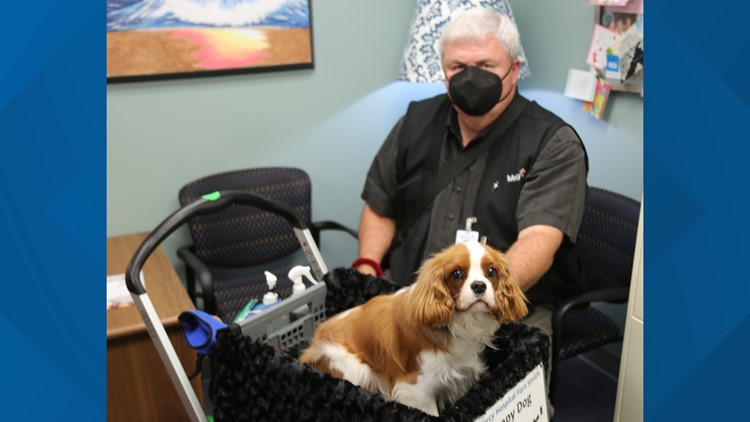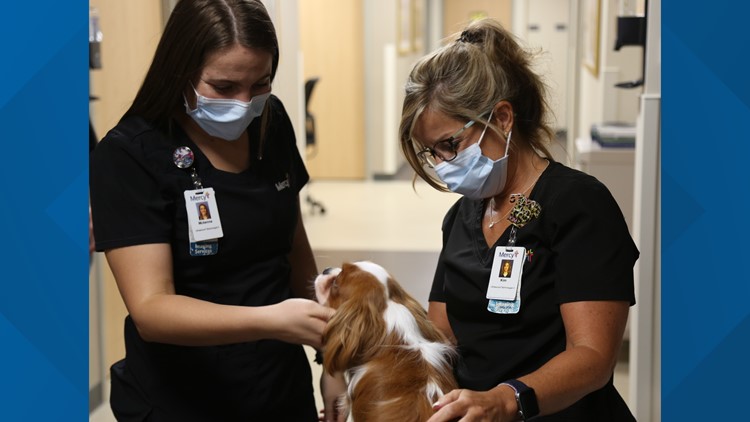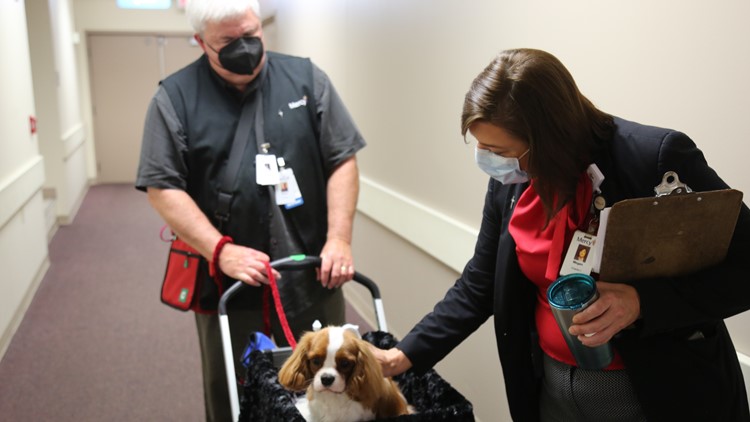FORT SMITH, Arkansas — A special volunteer is brightening up the day for workers, patients and families at Mercy Fort Smith.
Every Wednesday retired police officer Robert Mercer and his 10-month-old therapy dog Baxter visit Mercy in hopes to boost morale.
The mild-mannered pup is new on the job and spends two hours each week visiting Mercy workers, patients and families.
Robert's wife Cathy is a nurse practitioner at Mercy Fort Smith. She, along with Dr. Pamela Gaborni, have talked about having a therapy dog come into hospice and palliative care departments at Mercy Fort Smith for a number of years. Baxter has visited those departments along with others such as infusion and ultrasound over the past few weeks.
“Everything just kind of came together this summer,” Robert said. “We hope to get a whole slew of volunteers, but he’s the start, and I think he’s a good start.”
So far, Baxter is the only pup in Mercy Fort Smith's Therapy Dog program, but Robert and Volunteer Manager Jenni Powell hope to add more members soon. The program is open to any dog whose owner is willing to become a Mercy volunteer and accompany the dog on visits in the hospital.
Robert said calm, controllable dogs are a good fit to serve as therapy dogs and he's willing to assist in getting the dog trained and certified as a therapy dog. Powell would work with the dog’s caretaker on the volunteer side. The Alliance of National Therapy Dogs vouches for the dog following the certification process.
“The dog and handlers are one team,” Robert said. “It’s always a human-dog team. In a sense, he’s not a therapy dog, and I’m not a therapy dog handler. Baxter and I are a therapy dog-handler team.”
Mercy Fort Smith volunteers begin therapy dog program
Powell says both the dog and its handler would be signed up as volunteers.
“The dog would be signed up just like a human volunteer, but they of course would have different checkpoints, such as rabies shots,” she said.
“We’re not looking for volunteers with perfect show dogs or perfect obedience,” Robert said. Dogs should be receptive to strangers and not prone to nipping or barking, he said, and they should be non-reactive to other dogs.
According to Mercy Fort Smith, the goals of the dog therapy program include:
- Improve patients’ quality of stay.
- Improve mood and emotional well-being.
- Increase interactions and dialogue.
- Provide comfort and joy.
- Reduce anxiety and loneliness.
- Increase overall patient satisfaction.
- Provide stress relief and a more humanized work environment for hospital staff, visitors and families.
Powell says Baxter brightens the day of everyone at Mercy during his visits.
"It really is a huge deal to them, to be honest," she said. "We bring Baxter by and they’re like, ‘Oh my gosh, oh my gosh!'"
Although Baxter rides in his own custom cart so he doesn't get too tired, he stays leashed at all times. He is also bathed before each visit.
Robert says he would like to expand his therapy dog days, hoping to go from one day a week to two.
Mercy Fort Smith says national service dog organizations recommend just two hours a day for therapy dogs. Robert says he sees Baxter as helping to humanize what can be a sterile environment inside the hospital.
“I think he brings a little of the outside world in, and I think that’s nice,” he said. “Everybody else is disease-focused, from the doctors to the nurses to the families. Baxter could care less. He just wants to lick your face. It’s kind of nice to see that.”
Anyone interested in Mercy’s dog therapy program can email Jenni Powell at jeanette.powell@mercy.net, or click here to learn more about volunteering at Mercy.









